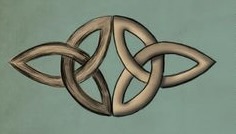Lately, I’ve been thinking about friendship—the loving connections between friends. In recent years, I’ve become quite a loner, but only in an incidental sort of way. I enjoy alone time—and probably need to have it—but it is contact with other people that gives my life its savor.
I live alone, but I need to have a real conversation with at least one person every day. I don’t mean that it has to be a conversation of emotional discovery, but it should be spontaneous, it should be seriously helpful or perhaps creative or quite funny. My friends matter because they connect me with parts of myself that I don’t necessarily have access to on my own. And also because they offer a special kind of support.
A friend recently underwent surgery, and this week when I delivered a care package to her, I learned that the last thing she had done before leaving for the hospital was to mail me a birthday card. I had loved receiving that card, but when I understood the circumstances behind it, those good wishes became even more precious. An impressive level of thoughtfulness had gone into sending them.
As I was leaving my friend’s house, I stopped for a moment to talk with her significant other, who was sitting on her front porch, sipping a finger of (I think) scotch and watching the sun wend it way toward the horizon. He mentioned that in the Celtic tradition, it’s thought that we die twice: once when we stop breathing and a second time when the final person who knows our story takes their final breath. I found this perspective riveting; I looked it up when I got home and discovered that it’s also associated with ancient Egypt and with the British street artist Banksy, whose version is this:
I mean, they say you die twice. One time when you stop breathing and a second time, a bit later on, when somebody says your name for the last time.
What I find compelling is the implication that the matrix of our connections is woven into our very being, into our life force. I especially like the version put forward by my friend’s friend—who, by this way of seeing things, would be a part of my friend, as I would be myself. He said that it isn’t just the name that forms this fabric, it’s our stories. Our friends are the people who know and care about our stories.
They might also be members of our family. When I was a child, my maternal grandmother told me two stories from her life—real stories, stories that mattered to her—and these stories will be in my heart as long as I live. In the final sixteen years of her life, my grandmother had profound Alzheimer’s and did not herself remember her stories. I remembered them, though, and I remember them still. Because she shared her stories, a part of my grandmother lives on.
After my last posting I received an email from a beloved friend—one of my very longest-time friends—telling me that she has been diagnosed with Alzheimer’s. I had a number of thoughts about this, all of which I shared with her, and one of these was the pain I felt knowing that she might at some point no longer remember significant moments the two of us had together—a cramped office we’d worked in, particular conversations we’d had, a life-altering coin toss… Realizing this was like a little death for me. I have known this woman for almost six decades, and our connection has its own existence. So, as long as my mind is functioning—and, of course, this has its own uncertainties—I will remember her. In fact, I think of this woman almost every day. We met in Hawaii, and one of the times I left the islands, she gave me a crystal so that I could take Hawaii’s rainbows with me. That crystal hangs in my living room now, and whenever it bends sunlight into glowing colors on the walls and ceiling, I remember my friend and her blessing.
Let me close these thoughts on friendship with the words of David Whyte, from his superb book Consolations:
But no matter the medicinal virtues of being a true friend or sustaining a long close relationship with another, the ultimate touchstone of friendship is not improvement, neither of the other nor of the self, the ultimate touchstone is witness, the privilege of having been seen by someone and the equal privilege of being granted the sight of the essence of another, to have walked with them and to have believed in them, and sometimes just to have accompanied them for however brief a span, on a journey impossible to accomplish alone.



